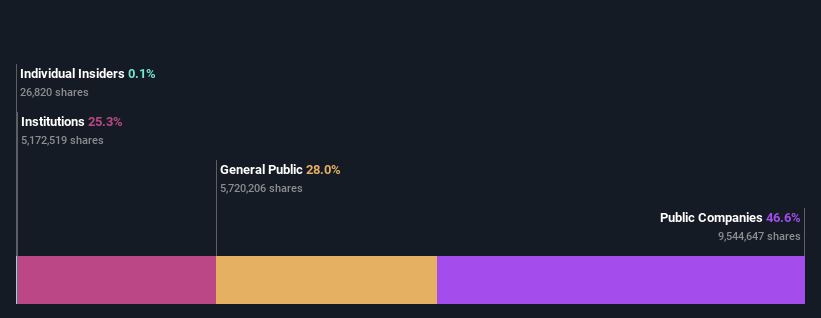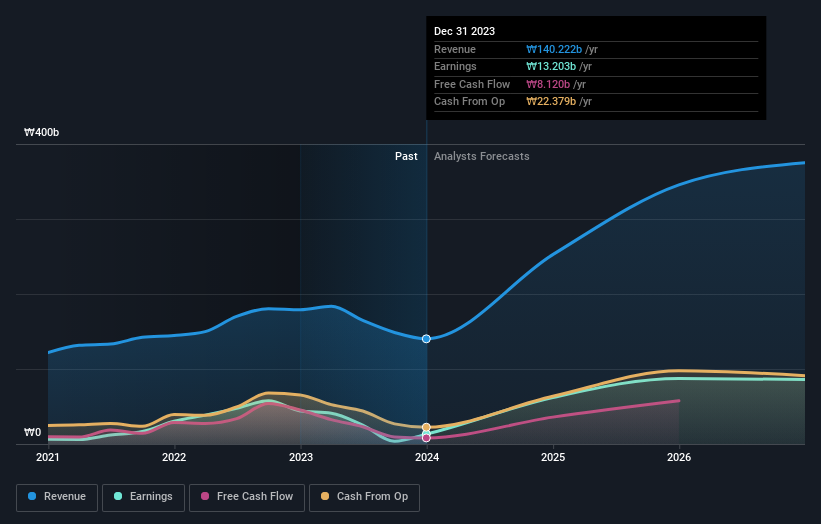Stock Analysis
- South Korea
- /
- Semiconductors
- /
- KOSDAQ:A095340
Public companies are ISC Co., Ltd.'s (KOSDAQ:095340) biggest owners and were hit after market cap dropped ₩111b

Key Insights
- Significant control over ISC by public companies implies that the general public has more power to influence management and governance-related decisions
- A total of 2 investors have a majority stake in the company with 55% ownership
- Institutional ownership in ISC is 25%
To get a sense of who is truly in control of ISC Co., Ltd. (KOSDAQ:095340), it is important to understand the ownership structure of the business. We can see that public companies own the lion's share in the company with 47% ownership. In other words, the group stands to gain the most (or lose the most) from their investment into the company.
As market cap fell to ₩1.6t last week, public companies would have faced the highest losses than any other shareholder groups of the company.
Let's delve deeper into each type of owner of ISC, beginning with the chart below.
Check out our latest analysis for ISC

What Does The Institutional Ownership Tell Us About ISC?
Institutional investors commonly compare their own returns to the returns of a commonly followed index. So they generally do consider buying larger companies that are included in the relevant benchmark index.
ISC already has institutions on the share registry. Indeed, they own a respectable stake in the company. This can indicate that the company has a certain degree of credibility in the investment community. However, it is best to be wary of relying on the supposed validation that comes with institutional investors. They too, get it wrong sometimes. When multiple institutions own a stock, there's always a risk that they are in a 'crowded trade'. When such a trade goes wrong, multiple parties may compete to sell stock fast. This risk is higher in a company without a history of growth. You can see ISC's historic earnings and revenue below, but keep in mind there's always more to the story.

Hedge funds don't have many shares in ISC. Our data shows that SKC Co., Ltd. is the largest shareholder with 47% of shares outstanding. For context, the second largest shareholder holds about 8.0% of the shares outstanding, followed by an ownership of 3.9% by the third-largest shareholder.
After doing some more digging, we found that the top 2 shareholders collectively control more than half of the company's shares, implying that they have considerable power to influence the company's decisions.
While studying institutional ownership for a company can add value to your research, it is also a good practice to research analyst recommendations to get a deeper understand of a stock's expected performance. There are plenty of analysts covering the stock, so it might be worth seeing what they are forecasting, too.
Insider Ownership Of ISC
While the precise definition of an insider can be subjective, almost everyone considers board members to be insiders. Management ultimately answers to the board. However, it is not uncommon for managers to be executive board members, especially if they are a founder or the CEO.
I generally consider insider ownership to be a good thing. However, on some occasions it makes it more difficult for other shareholders to hold the board accountable for decisions.
Our information suggests that ISC Co., Ltd. insiders own under 1% of the company. It's a big company, so even a small proportional interest can create alignment between the board and shareholders. In this case insiders own ₩2.2b worth of shares. It is good to see board members owning shares, but it might be worth checking if those insiders have been buying.
General Public Ownership
The general public-- including retail investors -- own 28% stake in the company, and hence can't easily be ignored. While this size of ownership may not be enough to sway a policy decision in their favour, they can still make a collective impact on company policies.
Public Company Ownership
Public companies currently own 47% of ISC stock. This may be a strategic interest and the two companies may have related business interests. It could be that they have de-merged. This holding is probably worth investigating further.
Next Steps:
While it is well worth considering the different groups that own a company, there are other factors that are even more important. Case in point: We've spotted 3 warning signs for ISC you should be aware of.
But ultimately it is the future, not the past, that will determine how well the owners of this business will do. Therefore we think it advisable to take a look at this free report showing whether analysts are predicting a brighter future.
NB: Figures in this article are calculated using data from the last twelve months, which refer to the 12-month period ending on the last date of the month the financial statement is dated. This may not be consistent with full year annual report figures.
Valuation is complex, but we're helping make it simple.
Find out whether ISC is potentially over or undervalued by checking out our comprehensive analysis, which includes fair value estimates, risks and warnings, dividends, insider transactions and financial health.
View the Free AnalysisHave feedback on this article? Concerned about the content? Get in touch with us directly. Alternatively, email editorial-team (at) simplywallst.com.
This article by Simply Wall St is general in nature. We provide commentary based on historical data and analyst forecasts only using an unbiased methodology and our articles are not intended to be financial advice. It does not constitute a recommendation to buy or sell any stock, and does not take account of your objectives, or your financial situation. We aim to bring you long-term focused analysis driven by fundamental data. Note that our analysis may not factor in the latest price-sensitive company announcements or qualitative material. Simply Wall St has no position in any stocks mentioned.
About KOSDAQ:A095340
ISC
ISC Co., Ltd. develops, manufactures, and sells semiconductor test sockets worldwide.
High growth potential with excellent balance sheet.

